Counting the Manongs and Manangs …
Alfredo G. Evangelista | Assistant Editor
All political power of this State is inherent in the people and the responsibility for the exercise thereof rests with the people. All government is founded on this authority. Section 1 of the Hawai‘i constitution.
Whenever voters elect a new Mayor or a new Governor, speculation on appointments to plum jobs starts political pundits’ tongues wagging. Political patronage—the authority of a new executive to pick his or her team—measures the influence of a particular group. In Hawai‘i’s diverse and multi-ethnic community, political power was historically denied to various immigrant groups.
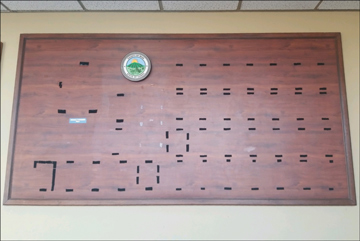
Photo: Dulce Karen Butay
In Hawai‘i, Filipinos were the last major immigrant group brought by the plantations to labor in the fields. Filipinos received the most menial jobs, lowest pay and the worst housing. While a few Filipinos ventured away from the plantations to start small businesses, the majority of the Sakada generation stayed and worked in sugar and pineapple.
Following statehood in 1959 and as more Filipinos arrived under President Lyndon Johnson’s Immigration and Nationality Act of 1965, Filipinos became more interested and involved in the political process. Involvement did not translate to patronage, evidenced by a continuing scarcity of Filipinos employed by the County and State governments in administrative jobs.
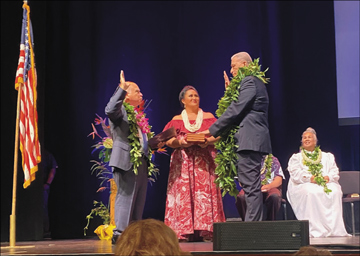
Photo: Gil Keith-Agaran
Three years after the new federal Immigration law went into effect, Artemio Baxa, Roger Cachola, and Phil Domingo—all recent immigrants—were hired as the first Filipino newcomers to work at Maui County under what was called a Work Experience Program. Assigned to Mayor Elmer Cravalho’s office, Cravalho personally paid for the salaries of Baxa, Cachola and Domingo because the Board of Supervisors did not initially approve the program. It would be a couple of years before the County Council agreed to fund the Work Experience Program which drew more talented Filipinos like Vince Bagoyo, Jr. to county white collar employment. Bagoyo would later be appointed by Mayor Hannibal Tavares as Director of the Department of Housing and Human Concerns and eventually the Department of Water Supply. When Tavares appointed Bagoyo to the Department of Water Supply, Tavares then appointed Robert Agres, Jr. as Director of the Department of Housing and Human Concerns.
While remembered in the local community for his support, aside from Selberio Menor (Administrator of the Department of Civil Defense) and Claro Capili, Cravalho did not appoint any Filipinos as his Department Directors. But Capili was appointed as Managing Director in 1979 and when Cravalho resigned only months later, Capili became Acting Mayor. (Interestingly, the wall lined with Managing Director’s photographs created during the last days of the Arakawa administration mistakenly identifies Capili as Maui’s first Managing Director; rather, Shigeto “Mustard” Murayama actually served as Cravalho’s first Managing Director.)

Photo: Alfredo G. Evangelista
Over the years, most Maui Mayors made only a few appointments of Filipinos as Directors of Departments including the following:
• In 1995, newly elected Linda Lingle appointed Henry Oliva as Director of Parks and Recreation.
• In 2003, newly elected Alan Arakawa appointed Gilbert Coloma-Agaran as Director of Public Works and Waste Management.
• In 2007, newly elected Charmaine Tavares appointed Benjamin Acob as Prosecuting Attorney. Later, Tavares appointed Agnes Macadangdang Hayashi as Director of Finance in 2010.
• In 2011, Mayor Arakawa, reclaiming the ninth floor, appointed Danny Agsalog as Director of Finance.
• In 2015, re-elected Mayor Arakawa reappointed Danny Agsalog as Director of Finance and added Kaala Buenconsejo as Director of Parks & Recreation.
• In 2019, Mayor Michael Victorino did not initially appoint any Filipinos as Department Directors. A few months into his term, Victorino did elevate then-
Deputy Director Rowena Dagdag-Andaya to head the Department of Public Works when the County Council rejected Victorino’s initial appointee, David Goode from the Arakawa administration. Victorino also appointed Don Guzman as Prosecuting Attorney when the Council also turned down his initial pick, carry-over John D. Kim from the Arakawa administration. (Victorino later terminated Guzman for a violation of the County’s workplace violence policy and the County Council approved the removal. Guzman then sued Victorino and the County Council for wrongful termination. After a trial in federal court, Guzman reportedly received $75,000.00, substantially less than the $600,000.00 he sought in a proposed settlement with the County.)
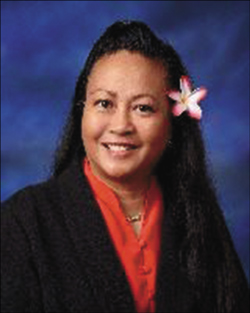
Photo courtesy County of Maui
This year, except for reappointing Victorino’s Agriculture Director Rogerene “Kali” Montero Arce, newly elected Mayor Richard Bissen passed on including any Filipinos as Directors. (When Arce was previously appointed by Victorino in July 2022 to become the first director of the newly created Department of Agriculture, most news agencies identified the part-Filipino Molokai resident as a Native Hawaiian. Arce who is 50 percent Filipino, was named after her Dad Rogelio. She traces her roots to the Ilocos and Cebu regions. Arce’s paternal grandfather Pio Montero was from Santa Maria in the Province of Ilocos Sur while her paternal great grandparents Gervacio Caballes and Segunda Sevilla Caballes were from Cebu. Gervacio was a Sakada who arrived in Oahu in 1923 and later assigned to Hawai‘i island.)
In years past, members of Maui’s Filipino community would complain about the lack of Filipinos being appointed to the Mayor’s cabinet. Some would even write a letter to the editor of The Maui News. But this year the noise level from Maui’s Filipino community is minimal. It’s not that Maui’s Filipino community no longer cares if they are represented on the Cabinet. Rather, no one from Maui wanted to go on record to express their opinions.
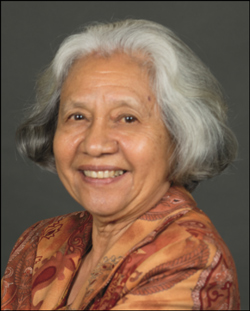
Photo courtesy Agbayani
Amefil “Amy” Agbayani, who started Operation Manong and is currently Co-Chair of Hawai‘i Friends of Civil Rights explains why it’s important for the Filipino community to be represented. “Diversity is a strength. Inclusion and representation are Hawai‘i values. Inclusion of Filipinos is consistent with values of equity, diversity and government’s responsibility to serve and represent members of the community.” Agbayani notes Filipinos comprise the second largest ethnic group in the State and says “Excluding competent Filipinos from the cabinet means a significant segment of Maui’s multi-ethnic community is unrepresented even though Filipinos contribute to the community as taxpayers, voters, professionals, workers, and neighbors.” Agbayani believes “programs, policies and processes are better where there is a diversity of backgrounds, opinions and experiences.”
Mila Medallon Kaahanui who led fights against discrimination in the trenches agrees with Agbayani. “Filipinos comprise a large segment of Hawai‘i’s population but are the least represented at the top executive levels of state and local governments. Government leaders must work towards a more diverse governing team representing a culturally diverse population’s hopes, dreams, needs and aspirations.”
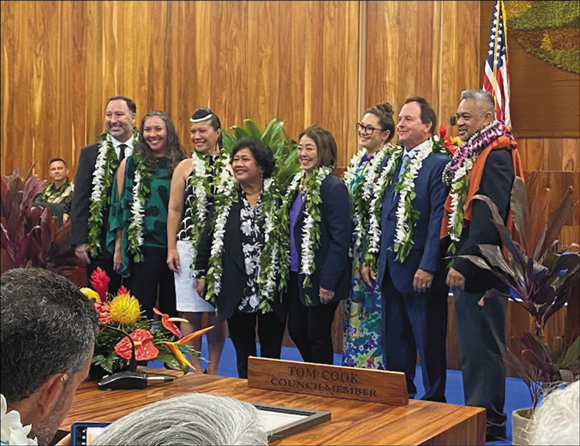
Photo: Gil Keith-Agaran
In fairness to Mayor Bissen and other Mayors, the appointment of Cabinets, and of Filipinos as department Directors is not easy. First, the application process is confidential so except for members of the transition team, no one knows the full pool of applicants. Few people outside of the process would know if anyone of Filipino ancestry applied to become a department Director and whether that applicant met the requirements and qualifications for selection. Second, whether a Mayor actively recruited Filipino applicants, privacy concerns for personnel issues prohibit disclosure. (Four years ago, during an interview with The Fil-Am Voice, Victorino shared he asked four Filipinos—without naming them—to join his cabinet but they all declined.) Third, two of the departments (Corporation Counsel and Prosecuting Attorney) require a specific credential; for those two departments a law license. Quick question: How many active attorneys of Filipino ancestry live on Maui? Probably at the most a dozen, which is not an exceptionally large pool of applicants. Fourth, a qualified applicant must be willing to accept the pay scale of the public sector, normally less than the private sector. Finally, qualified applicants may not want to subject themselves and their families through the County Council confirmation process, which can include sometimes combative and harsh public testimony. Until recently only the County legal department heads and the Water director required County Council approval. (During the recent organizational meeting of the County Council, some of the Council’s appointees were called names and ridiculed).
James “Kimo” Apana, who was elected Mayor in 1999, explains why he did not initially appoint any Filipinos as directors of the departments. “For me, the majority of my Directors were either a Director or a Deputy in a prior administration. I didn’t want to throw anybody straight into the fire.” When Apana’s Managing Director Grant Chun left for the private sector late in Apana’s term, Michelle Manibog Yoshimura was appointed Managing Director for the remainder of Apana’s term.
Even Governor Benjamin Cayetano’s selections received scrutiny for a paucity of Filipinos in his first cabinet. Every time Cayetano announced appointments, a small group of Filipino leaders would show up to observe, watching for a cabinet director. In his eight years as Governor, Cayetano appointed four Filipinos as Directors: Leonard Agor, as director of the Department of Labor and Industrial Relations; Sam Callejo, as State Comptroller for the Department of Accounting and General Services; Gilbert Coloma-Agaran, as Chairman of the Board of Land & Natural Resources and as director of the Department of Labor and Industrial Relations; and George Iranon as director of the Department of Public Safety. (Cayetano did select a number of Filipinos as Deputy Directors as well as senior staff and filled vacancies in the Judiciary and the Legislature.)

New Governor Josh Green appointed three Filipinos as Directors: Luis Salaveria as the Director of Budget and Finance, Catherine Betts as Director of Human Services and Jade Butay as Director of Labor and Industrial Relations. (Butay served as Director of Transportation under Governor Ige. Salaveria served as Director of the Business, Economic Development and Tourism under Governor Ige. Betts served as Director of Human Services under Governor Ige.)
Hawai‘i’s Filipino community marked 100 years since the first Sakadas arrived in Hawai‘i in 2006, celebrating with pride a century of accomplishments. Many in the community boasted “The Filipinos have arrived.”
Undoubtedly Filipinos have made considerable progress throughout island society since 1906. But until Filipinos regularly hold seats not only as political appointees but also as members of the Board of Directors of major local corporations and businesses, can the community truly boast and say, “We have arrived.”
Until then, the local Pinoy pundits can only count the Manongs and Manangs …
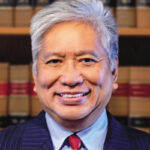 Alfredo G. Evangelista received his Bachelor of Arts in Political Science from the University of Southern California (1980) after graduating from Maui High School (1976) and before receiving his law degree from the University of California at Los Angeles School of Law (1983). He is a sole practitioner at Law Offices of Alfredo Evangelista, A Limited Liability Law Company, concentrating in estate planning, business start-up and consultation, nonprofit corporations, and litigation. He has been practicing law for 39 years (since 1983) and returned home in 2010 to be with his family and to marry his high school sweetheart, the former Basilia Tumacder Idica.
Alfredo G. Evangelista received his Bachelor of Arts in Political Science from the University of Southern California (1980) after graduating from Maui High School (1976) and before receiving his law degree from the University of California at Los Angeles School of Law (1983). He is a sole practitioner at Law Offices of Alfredo Evangelista, A Limited Liability Law Company, concentrating in estate planning, business start-up and consultation, nonprofit corporations, and litigation. He has been practicing law for 39 years (since 1983) and returned home in 2010 to be with his family and to marry his high school sweetheart, the former Basilia Tumacder Idica.
